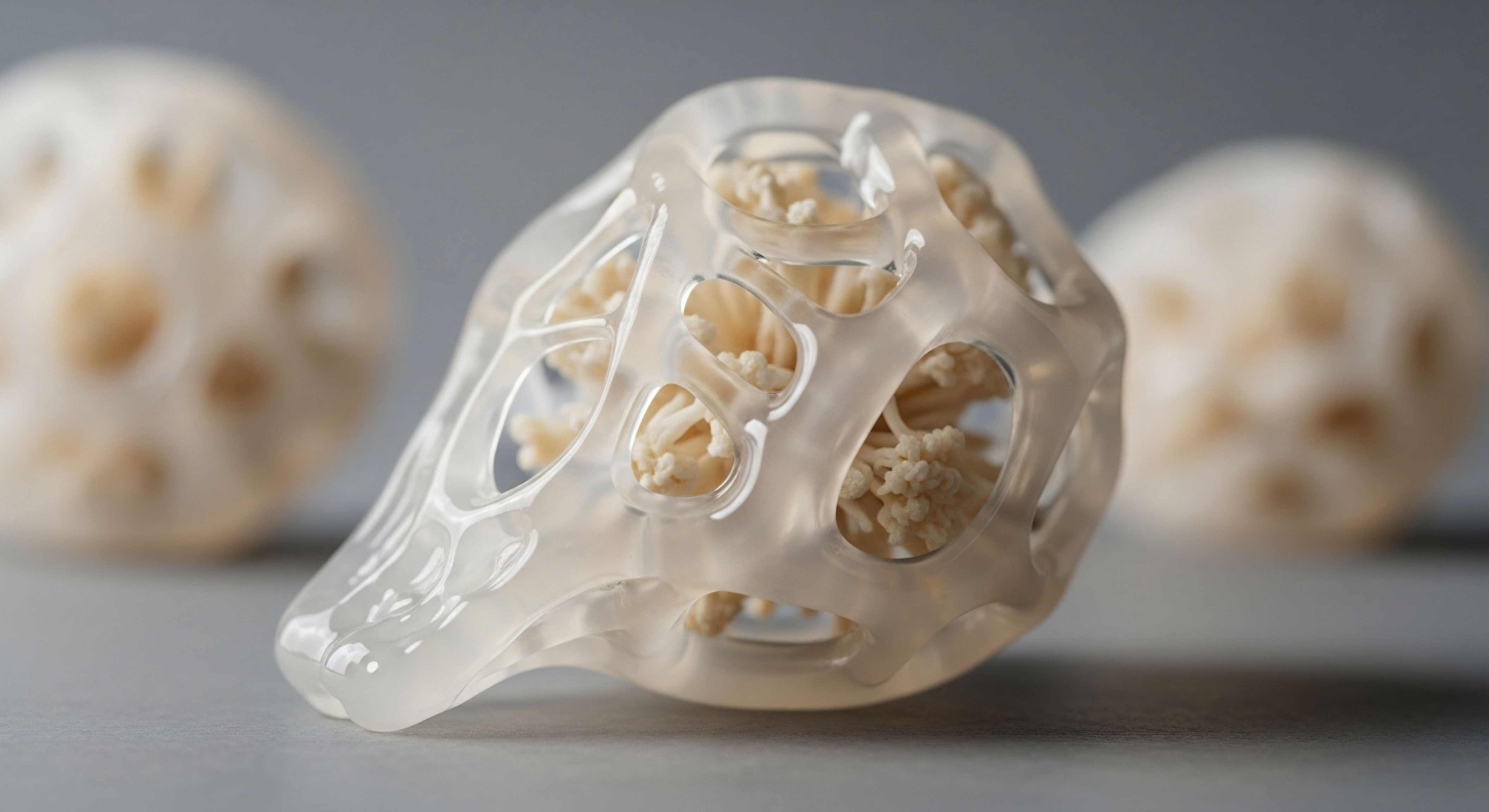

The Currency of Circadian Capital
Your capacity for daytime performance ∞ cognitive output, physical power, metabolic efficiency ∞ is a direct asset. This asset, your vitality, is not earned during the morning rush or the afternoon grind. It is meticulously compounded in the darkness, during the precise biological processes of sleep.
Each night presents a non-negotiable opportunity to invest in this physiological capital. The quality of this investment dictates the richness of the return, measured in clarity of thought, resilience to stress, and the very architecture of your physique.
The body operates as a system of interconnected hormonal ledgers, governed by the master clock of circadian rhythm. The synthesis, secretion, and metabolism of hormones are synchronized with this primal rhythm. When this rhythm is respected, the system flourishes.
Key hormones like growth hormone, cortisol, and the metabolic regulators leptin and ghrelin are released in precise, powerful pulses that repair, rebuild, and refuel the entire system. This nocturnal symphony is the engine of daytime mastery. Disrupting it through inconsistent sleep is a direct withdrawal from your performance accounts, incurring a debt that manifests as metabolic syndrome, hormonal imbalance, and accelerated aging.


The Midnight Molecular Forge
The hours spent in sleep are the most productive of the entire 24-hour cycle. This is when the body initiates a series of sophisticated, automated protocols to recalibrate its chemistry for the following day. This is the work of the midnight molecular forge, where the raw materials of biology are transformed into the finished products of peak performance.

The Anabolic Pulse
The most significant event in this process is the release of human growth hormone (HGH). The largest and most predictable pulse of HGH occurs shortly after sleep onset, specifically during deep, slow-wave sleep (SWS). This is the body’s primary anabolic signal, initiating the repair of muscle tissue, the mobilization of fat for energy, and the maintenance of cellular integrity.
Cutting sleep short, or failing to achieve sufficient SWS, directly blunts this critical pulse. The consequence is a diminished capacity to recover from physical stress, an increased likelihood of accumulating visceral fat, and a compromised cellular repair system.

The Stress System Reboot
Sleep is the primary regulator of the hypothalamic-pituitary-adrenal (HPA) axis, the body’s central stress response system. Proper sleep profoundly suppresses the release of cortisol, the classic stress hormone. This period of low cortisol allows the system to reset its sensitivity.
A sharp, beneficial cortisol peak within 30 minutes of waking is the signal that sets the tempo for all other hormones, including thyroid and sex hormones. Chronic sleep restriction disrupts this process, leading to elevated cortisol levels throughout the latter part of the day. This pattern mimics the hormonal profile of aging, driving insulin resistance and systemic inflammation.
Sleep deprivation disrupts sleep architecture, perturbs hormonal dynamics, and adversely affects glucose metabolism and metabolic rate.

The Metabolic Ledger
Body composition is largely governed by the interplay of two hormones ∞ leptin and ghrelin. Leptin signals satiety to the brain, while ghrelin signals hunger. Their balance is acutely sensitive to sleep duration and quality. Even short-term sleep deprivation causes a significant drop in leptin and a simultaneous rise in ghrelin.
This chemical shift creates a powerful, often irresistible, drive for increased calorie consumption, particularly of energy-dense foods. This dysregulation provides the direct molecular link between poor sleep and an increased risk of obesity.

The Insulin Sensitivity Switch
The body’s ability to efficiently manage glucose is a cornerstone of metabolic health. Sleep is a master regulator of insulin sensitivity. Even minor sleep restrictions have been shown to impair glucose tolerance and reduce insulin sensitivity in fatty tissue.
This occurs because disrupted sleep perturbs the natural circadian variation in insulin secretion, leading to elevated glucose levels and a state of insulin resistance. This places an enormous strain on the pancreas and is a primary pathway to the development of metabolic syndrome and type 2 diabetes.


The Chronological Precision Protocol
Understanding the chemistry is the prerequisite. Applying it with chronological precision is the protocol. Mastery is achieved when the principles of nocturnal biology are translated into a disciplined, non-negotiable practice. The timing of your actions is as critical as the actions themselves.

Synchronizing the Master Clock
The entire hormonal cascade is entrained by the master clock in the brain, which is synchronized primarily by light exposure. The foundation of nighttime chemistry is a rigid sleep-wake schedule, seven days a week. This consistency stabilizes the rhythm, allowing for predictable and robust hormonal releases.
Morning exposure to natural light reinforces the wakefulness signal and solidifies the cortisol awakening response. Conversely, minimizing exposure to blue light in the evening allows for a natural rise in melatonin, the hormone that signals the onset of the biological night.

The Slow-Wave Sleep Mandate
The most valuable work of the night happens early. The first few hours of sleep are when the body prioritizes slow-wave sleep, the deepest and most restorative stage. This is the window for the peak release of growth hormone. To capitalize on this, the focus shifts from merely accumulating hours of sleep to ensuring the quality and depth of the initial sleep cycles. This means creating an environment conducive to uninterrupted deep sleep from the moment of sleep onset.
Key actions to secure this deep sleep window include:
- Thermal Regulation: A slight drop in core body temperature is a powerful sleep-onset signal. A cool sleeping environment actively supports the transition into and maintenance of deep sleep.
- Glycemic Control: A large, high-glycemic meal close to bedtime can disrupt blood sugar and core body temperature, interfering with the ability to enter SWS. Prioritize stable blood glucose levels in the hours before sleep.
- Acoustic and Light Discipline: The brain remains sensitive to stimuli even during sleep. Complete darkness and silence are non-negotiable for protecting the integrity of sleep cycles and preventing arousals that pull you out of SWS.

Mastery Is a Function of Night
The prevailing view of success is one of relentless daytime effort. This is a profound miscalculation. The true arena of high performance is the disciplined management of your biology during the hours of darkness. The body is not merely resting; it is actively rebuilding the very foundations of your health and ambition.
To treat sleep as a passive obligation is to forfeit your greatest physiological advantage. True mastery is a function of the night. It is the deliberate, strategic investment in your internal chemistry that unlocks the full potential of the day.



